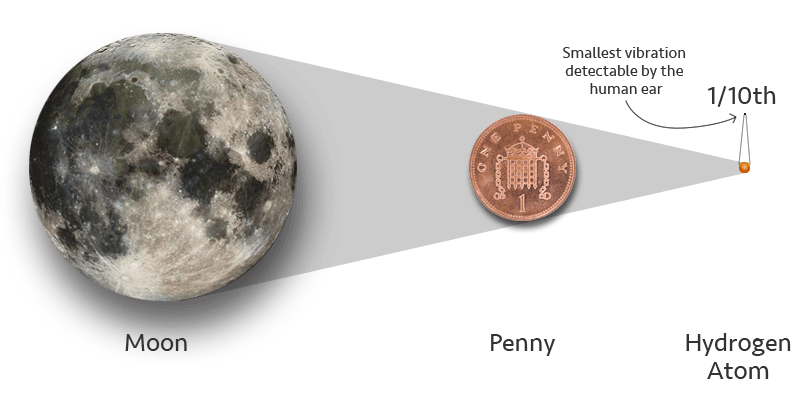Hearing is the brain's main 24/7 connection to the world around us. It's always on duty, even when our eyes are taking a break. It acts as our early warning system, keeps us safe at night, and keeps us ready for opportunity – even when we're not actively looking for it.
Total connectivity
Whether by design or evolution, hearing is constantly online, continuously connecting the external world with our own internal one.
Hearing doesn't have an off button, and we can't just shut our ears as we can our eyes—which should give us some clue as to just how important hearing is. It relentlessly provides us with an uninterrupted stream of information about our environment long before we are even born, gathering data from every direction and delivering us a live feed of changes happening around us.
What in the world is happening?
The human ear can detect vibrations within the air that are 1/10th the size of a hydrogen atom. If you want to know how small that is, imagine a penny dropped onto the surface of the moon: that's the same relationship in size that a hydrogen atom has compared to a penny.

Even more amazingly, our ears are keeping track of millions upon millions of these tiny vibrations which bombard us from all directions, grouping them together then extracting meaning from their relationship with one another. You can read more about this impressive feat in The Hearing Chain
This incredible ability means that our brain is in constant contact with everything that is “doing is something” at the exact same time and in the exact same place as we happen to be. Such a barrage of information could very easily overwhelm us if we were to attend to it all – so the brain prioritises these messages, focusing on some and ignoring others. And top of its priorty list are the things that may be a threat to our safety.
Early warning system


“Something's changed...”
Our life experiences teach the brain what to consider as ‘normal’. For example, if we've lived for many years by a railway track we may be used to hearing a train thundering past our house at 3am every morning. The noise doesn't wake us up, because our repeated experience tells us to expect it.
But say one morning we weren't to hear the train, what happens then? The brain is likely to flag up this mismatch in expectation and draw our attention to it for further investigation. So the brain is constantly looking for change or mismatches against its expectations. This acts as a very effective early warning system that works without any need of conscious awareness, so it can operate even whilst we sleep or doing other things.
This is why many people can sleep through a thunderstorm but wake at the slightest creak of the floorboards. A thunderstorm at night time is rare but expected; a creaking floorboard is not...
“Snap!”
Sometimes we hear a sound that occurs at the exact same time as when we experience a strong emotional response, such as fear. For example, we may hear a dog bark suddenly at the same moment it suddenly runs out at us from nowhere.
This pairing of a sound with a strong emotion lays down a very strong memory that gets stored for future reference. Whenever we encounter the same sound in the future, our hearing takes a shortcut to our ‘freeze, flight or fight’ response to get us out of danger as rapidly as possible. It matches the incoming sound to an acoustic pattern that has been red-flagged in our memory as a threat.
The same happens for sounds that are particularly relevant to us, which is why people often find they can hear their own name spoken in another person's conversation on the other side of the room.
Expecting the unexpected
As well as acting as our unconscious early warning system, our hearing keeps us ready to expect the unexpected, so we're always ready for whatever life brings us. Hearing gets us to our flight on time, saves us money on repairs, keeps our families safe, reduces our blood pressure, and keeps our brains stimulated. It's our personal valet, our personal body guard, and our personal coach. It keeps us in the know and out of trouble.
Staying connected. Always.
You will sometimes hear people say, “I hear everything I want to hear”. When they do, ask them how they know.
Because clearly they do not understand the purpose of hearing. It was never meant to be an optional extra, something we switch on and off whenever we choose. It's supposed to keep us always connected, always online, always feeding the brain 24 hours of the day, seven days a week.
Because keeping our connection strong and constant is what keeps us from fading away.
To be certain your own hearing is performing at its best, be sure to book yourself in to have your hearing professionally profiled.
